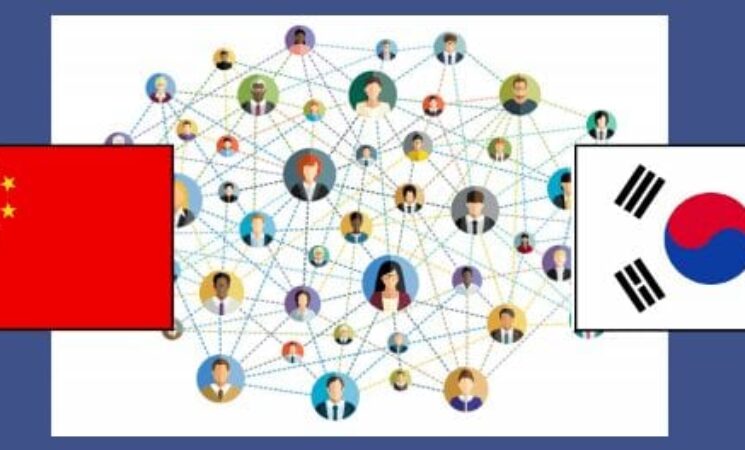The National Committee on American Foreign Policy (NCAFP) presents a virtual roundtable series for
emerging leaders in China and Korea studies on:
Regional Security Architecture of the Asia Pacific:
Past, Present and Future
Schedule and Speakers:
Past: Empires
Thursday, April 23, 2020: 12:00pm - 1:30pm
Speaker: Dr. Randolph Ford, SUNY Albany
Present: Managing Alliances
Friday, May 15, 2020: 12:00pm - 1:30pm
Speaker: Dr. Mira Rapp-Hooper, Council on Foreign Relations
Future: Weaponized Interdependence and Deglobalization
Friday, June 12, 2020: 12:00pm - 1:30pm
Speakers: Dr. Henry Farrell, George Washington University & Dr. Abraham Newman, Georgetown
To apply, please fill out an application at:
https://forms.gle/AwWpq2YmrCAf7udK6
This roundtable series was made possible with the support of the Korea Foundation.
***
Network with Fellow Emerging Leaders:
The National Committee is excited to bring together emerging leaders with interest and experience in China and Korea studies for expert-led discussions on regional security architecture.
The roundtable series will offer participants an opportunity to engage with scholars and experts on vital issues, and to network with fellow emerging leaders and policy professionals.
Participants should have at least 2 years professional experience with either China or Korea (internships and non-academic/research experience accepted).
***
Roundtable Descriptions:
Thursday, April 23: Regional Security Architecture of the Past: Empires
China often describes its central place in Asian history in terms of the rise and fall of dynastic empires. The scope and practices of empires have changed over time, but all have sought to expand through territorial conquest while mitigating the disruption of incorporating new identities into their society. Dr. Randolph B. Ford will join us to discuss how ancient Chinese empire used concepts of identity to consolidate power and how Chinese scholars today interpret that history to support political and societal goals. How does history live on in its modern interpretation? How does China view its place in the world, and for what does it expect to be recognized or emulated? What does identity have to do with political and security goals in East Asia, and how important are identity concepts to navigating great power competition today?
This discussion will build on themes from Dr. Ford’s forthcoming book, Rome, China, and the Barbarians: Ethnographic Traditions and the Transformation of Empires (available April 2020 from Cambridge University Press).
Friday, May 15: Regional Security Architecture of the Present: Alliances
Alliances, which have been a pillar of US security strategy since the end of World War II, are under new pressure as divergent threat perceptions and an increased focus on burden-sharing drive policy choices. China sees US treaty allies on its periphery as a constraint on policy choices; the two major US allies in East Asia—Japan and the ROK—do not seem to share a vision of a common, cooperative future. What is the proper role and structure for alliances in the post-Cold War era, and how will US efforts to reform the alliance structure affect the regional balance of power? Dr. Mira Rapp-Hooper will take us through the foundations of alliance policy from the mid-20th century to today, and offer suggestions for what might be done to preserve alliance benefits in today’s policy landscape.
This discussion will cover content from Dr. Rapp-Hooper’s forthcoming book, Shields of the Republic: The Triumph and Peril of America’s Alliances (available in June 2020 from Harvard University Press).
Friday, June 12: Regional Security Architecture of the Future: Weaponized Interdependence and Deglobalization
 The process of globalization over the last three decades has created a web of interconnected economic and security actors. But the concentration of resources best suited to economic efficiencies also creates new opportunities and challenges for states, to navigate and respond to the use of coercive leverage in which economic interests have been subject to political and security pressures. What are the features of “weaponized interdependence”? How are states reacting to the use of coercive leverage and what do these trends portend for cooperation, competition and conflict in the Asia Pacific? Profs. Henry Farrell and Abraham Newman will join us to discuss the future of interconnectedness and the mounting pressure toward deglobalization as a risk mitigation strategy.
The process of globalization over the last three decades has created a web of interconnected economic and security actors. But the concentration of resources best suited to economic efficiencies also creates new opportunities and challenges for states, to navigate and respond to the use of coercive leverage in which economic interests have been subject to political and security pressures. What are the features of “weaponized interdependence”? How are states reacting to the use of coercive leverage and what do these trends portend for cooperation, competition and conflict in the Asia Pacific? Profs. Henry Farrell and Abraham Newman will join us to discuss the future of interconnectedness and the mounting pressure toward deglobalization as a risk mitigation strategy.
Profs. Farrell and Newman have recently received the 2020 International Studies Association ICOMM Best Book Award as co-authors of Of Privacy and Power: The Transatlantic Struggle over Freedom and Security (Princeton University Press, 2019). This discussion will also reference Profs. Farrell and Newman’s recent work on weaponized interdependence, including articles in International Security and The Washington Quarterly.

